Pop Courtney Reflects On 25 Byrnes Years
A Living Memorial: June 13, 1998
The following is an abbreviated version of Andy's speech at
the luncheon. Andy "Pop" Courtney has been an integral part
of the Byrnes family since his wife, Margaret, was hired in 1973 as Executive
Secretary of The Byrnes Foundation. His contribution was recognized by
the Scholars in 1981 when they named Andy an Honorary
Byrnes Scholar.
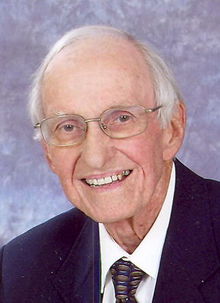
My
first impulse was to ask her if she was serious. If she thought I had
lost my mind. Or, worse yet, if she had lost her mind. The question had
been simple enough, "Do you want to help me take the Byrnes Scholars
to the beach for a weekend?" My answer was just as simple. "No,
I don't think so." When Margaret was employed by the James F. Byrnes
Foundation in 1973, there were only about 35 students on scholarship.
The first Super Weekend was in March 1975 and was attended by 27 students
and 22 others. I wasn't one of those others as younger daughter, Karen,
provided me with my out. She was then a senior in high school, a cheerleader,
and had a basketball game that Saturday night. So it was, "Sorry,
honey, one of us will have to stay home. Gee, I sure wish I could go,
but, next year maybe." These words proved to be prophetic. The following
year Karen was a freshman at Clemson, older daughter, Jane, was a senior
at Furman, and my excuse had run its course. So that Friday afternoon
in March 1976, I turned off the light in my office, closed the door,
and drove a few blocks to the campus at USC. There I met the chartered
bus full of young Byrnes Scholars on their way to Garden City Beach for
a weekend of fun, fellowship and, as I soon learned, inspiration.
Four Things About Super Weekend
Four things stand out in my memory of my first Super Weekend.
First, I remember helping Jake Salley wash pots and pans, carry out
garbage and generally be a handy man around the camp. I will always be
thankful for having known Jake and sharing kitchen duties with him. Jake
was the kind of man who showed you the way by example. He didn't say, "Now
I want you to carry out the garbage;" he just took hold of one side
of the garbage can, and you knew right away that he expected you to grab
the other side. An untimely death from a heart attack took Jake from
us long before we were ready to give him up. I hold Jake in my memory
as one who exemplified the spirit of Byrnes Scholars.
The second thing that I remember about that weekend is a tall skinny
sophomore from Clemson with straggly blond hair and a complete lack of
ability to stand up on roller skates. Daughter Jane attended this Super
Weekend, and I think his total ineptness in skating sparked some sort
of protective instinct in her, and the next thing I heard about him was
that he suddenly became interested in Furman University's beautiful campus
and was making trips over there. Little did I dream that this tall skinny
guy would someday be the husband of my first born daughter and the father
of my grandson, Jacob, self-appointed Byrnes Scholar extraordinary. You
present day students who recently may have struggled through an interview
with the selection committee, note that I did say Dal Poston was skinny
and had straggly blond hair.
My third memory of that weekend was of a young man who, during a sharing
time, arose and spontaneously and in a cappella began to sing a beautiful
spiritual hymn. That young man was Ronnie Daise, now known as "Mr.
Ron" in my younger grandchildren's favorite TV show, Gullah,
Gullah Island. In addition to his successful TV program, Ron has
also authored a number of books.
The fourth thing that made a strong impression on me was to watch Hal
Norton in action. There are few people with the unique leadership ability
that Hal possesses. In a very short time he can change a group of near
strangers, whether 50 or 150, into a close-knit unit, sharing, caring,
laughing, singing, playing, praying, and worshipping.
A Caring Relationship
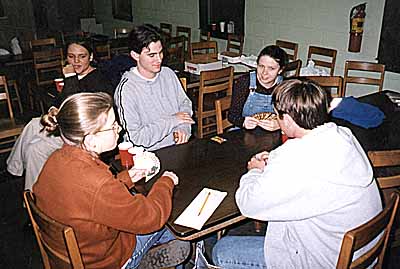
Some
of the fun things about Super Weekend cannot be fully appreciated unless
they have been experienced personally. The highly competitive games of
spoons don't sound like anything special unless you have been there and
have the scars to prove it. Spontaneous times of singing in small groups
as someone picks out tunes on a guitar or piano may actually sound a
little corny, but they fill my memory banks as I think about the good
times with you all. And, there are the involuntary dips in the ocean
taken by some, and the not-so-sophisticated games that Hal always leads
in. There was one scholar from an institution, the name of which I will
not divulge, who learned the alphabet while playing Hal's nursery rhyme
game. The skits put on by the students, often with the unwilling help
of the old timers, are important parts of the beach trips. Where else
could you see a family court judge play the part of sap running through
the trees?
…It goes without saying that I have missed very few Super Weekends
since 1976. I have found the beach weekends along with the fall meetings
and June luncheons to be highlights of the years following and I hope
for many future years.
Being a part of the Byrnes Scholars family has not been just participation
in Super Weekends. More importantly, through the years, it has been a
caring relationship with a great group of young and not so young folks.
It has been looking forward each June to this luncheon and renewing friendships
made in March at the beach or at the fall meetings. Our relationship
as Byrnes Scholars goes beyond race, sex, national origin, family background
and even school affiliation. It is unique in that you wonder how you
can love these people so much and yet see them only once or twice a year
and even have difficulty at times remembering their names.
Pop Byrnes As A Political Icon
Now, for a few minutes, I want to turn our attention to the man responsible
for all of this. The man who had a dream to help young people without
one, or perhaps both, of their parents, in achieving a college education.
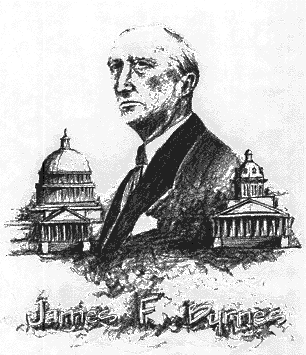
My
first awareness of James F. Byrnes was his reelection to the US Senate,
for a second term, in 1936. Prior to his election to the Senate in 1930,
he had served seven terms as a member of the House of Representatives.
I was a young boy in elementary school at that time. My father, who grew
up in Aiken, was always quick to announce that he knew Jimmy Byrnes when
he was court reporter in Aiken County. That year, 1936, he won a smashing
victory over two opponents in the Democratic primary, which in those
days was tantamount to election because the Republican party, at that
time, was practically nonexistent in South Carolina. It was customary
for all candidates to meet jointly in each county seat to present their
views. These sessions came to be known as stump meetings. Walter Brown
reports in his book, James F. Byrnes, A Remembrance, that Byrnes
followed his practice of never mentioning his opponents by name and instead
presented an affirmative statement as to why he should be nominated.
His philosophy since he entered public life was that anything he said
against his opponents would not show the voters why he would make a better
public official. Mr. Brown also reports that Byrnes did not accept checks
from contributors outside the state of South Carolina. He stated that
when he returned to Washington he did not want to be under obligations
to anyone except the people of South Carolina. I find this to be refreshing
and in great contrast to present day campaign practices.
Mr. Byrnes served in the US Senate until June of 1941 when he was appointed
to the US Supreme Court by President Roosevelt. In 1942 he resigned from
the Supreme Court to serve as the Director of the Office of Economic
Stabilization and then in 1943 was named Director of the Office of War
Mobilization. In this position he became known, unofficially, as "the
Assistant President."
After the death of Roosevelt in April 1945, he was appointed by President
Truman as Secretary of State. As a young GI in the European Theater of
Operations, I was always proud to tell my buddies that this famous man,
so much a part of our nation's WWII effort, was a fellow South Carolinian.
Byrnes Didn't Want A Memory In Brick Or Stone
At the time of his death, the Spartanburg Herald wrote in its
April 11, 1972, issue the following:
The public service of James F. Byrnes is enshrined in the history
of his nation and state. His name will rank in the heritage of South
Carolina. with those of Rutledge, Pinckney, Calhoun and Wade Hampton…Here
was a boy left fatherless as a babe, a boy who helped support his mother
by selling newspapers and doing odd jobs. A boy who had to pass up not
only college, but high school as well. A young man who studied to master
shorthand and became a competent court reporter. He learned law (through
reading and studying) and was admitted to the Bar at age 24. After serving
14 years in the US House of Representatives, and losing a race for US
Senator in 1924, he moved to Spartanburg. Six years later, he went to
the Senate by beating the man who had defeated him – Coleman L.
Blease. From there, he progressed to the highest councils of national
government and international diplomacy.
In referring, at this same time, to the scholarship that he began, the
Herald said:
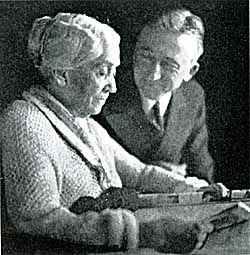 Mr.
Byrnes said service to people was the only monument he felt worth leaving.
His scholarship program has helped more than 300 men and women who had
lost one or both parents. It symbolizes the closeness he kept with people.
Over and over scholars repeat the refrain: "I don't know how I could
have gone to college without his scholarship, but he gave much more important
things than what he gave in dollars." He didn't want a memory in
brick or stone. He wanted a memory that would live after he was gone.
Mr.
Byrnes said service to people was the only monument he felt worth leaving.
His scholarship program has helped more than 300 men and women who had
lost one or both parents. It symbolizes the closeness he kept with people.
Over and over scholars repeat the refrain: "I don't know how I could
have gone to college without his scholarship, but he gave much more important
things than what he gave in dollars." He didn't want a memory in
brick or stone. He wanted a memory that would live after he was gone.
I think what we are doing here today verifies that that memory lives
on.
This Is What I Cherish Most

Photo by Larry Cribb: Sandlapper® magazine
founder and editor Bob Wilkins, left, and Del Roberts, later editor,
examine 1950 scholar Rachel Oldham's portrait of Byrnes in 1970. The
portrait was used on the magazine's first-ever cover.
This is what I cherish most of my Byrnes Scholars memories:
- The
privilege of knowing Mrs. Maude Byrnes in the earlier days of our association
with the Byrnes Scholars. She was a lovely and gracious southern lady
who I am sure must have been a wonderful asset in her husband's public
career. I remember the time that she called our home to speak with
Margaret. I told her that Margaret had gone to prepare a picnic for
the Scholars. She replied excitedly, "Yes, I know, I am going
too!" And I thought, how unique that is, here is the widow of
the man who made this organization possible and she is excited that
she has been invited to a picnic… .
- I cherish having known Willie Byrd, faithful chauffeur, cook, housekeeper
and companion to the Byrnes. I enjoyed listening to Willie Byrd's own
brand of homespun philosophy and feel the richer for having known him.
- Knowing G. Richard Shafto, one of the giants in the South Carolina
radio and TV industry. When Mr. Byrnes, because of failing health,
could no longer carry on the work of the foundation, he turned to Dick
Shafto, his good friend arid neighbor, to become the first president
of the foundation.
- Fellow-shipping with Bill Workman at Super Weekends. I'll never
forget our attempt to make music come out of partially filled Pepsi
bottles… . I also will never forget the sight of his wife, Tommie,
a college professor, as she doffed her shoes and showed us that she
could do with her toes what many of us cannot with our hands, play
the piano. Bill Workman was a giant in the field of journalism and
a brilliant man. At one time a candidate for the US Senate and for
the office of governor, Bill still found time, during the days that
he was editor of The State newspaper, to serve as president
of the foundation. He was very involved in all of its functions and
had a caring relationship with the students.
- I remember Anthony Raymond, a 1978 Byrnes Scholar, Phi Beta Kappa,
with bachelor and Juris Doctorate degrees. Anthony was a quadriplegic
due to an accident when he was a teenager. I will always remember the
words "I will walk again" posted over the bed where his condition
required him to spend much time. Anthony never reached his goal in
this life but, as someone has said, "I imagine the angels are
still marveling at the new boy who is still running around the streets
of heaven on strong legs."
- I think of the young men and women who came to us as new scholars.
Some cocky and sure of themselves, others not so confident, maybe a
little scared or lonely, looking for acceptance and a little boost
in self-assurance. Some just breezed through school it seemed without
a care or stumbling at all… Some struggled with their studies.
Even received letters from Mom Courtney telling them in a caring but
firm way that they needed to work harder and get those grades up. Some
had to be admonished to fulfill the terms of their scholarship by participation
in the activities of the foundation as they had agreed to do upon accepting
their scholarship. I can tell you without fear of contradiction that
she enjoyed having to do this no more than she enjoyed disciplining
her own children.
During our 20-year official affiliation with the Byrnes Scholars, 467
scholarships were awarded. From this number, some have gone on to receive
master's degrees and some PhD's. Some have become medical doctors and
nurses. Some have become lawyers and CPA's. Some, both men and women,
have become career officers in our armed forces. Some are in full time
church work as pastors, ministers of music or other staff positions.
Some are pharmacists, others teachers. Some are self-employed; others
are officers and executives in our industries. Some are engineers and
others are architects. Some of our young women took on the noblest of
professions, that of being a mother and devoting full time to caring
for and nurturing a family. I believe that Jimmy Byrnes' vision and his
desire to leave a monument worth remembering has been achieved. You,
his Scholars, are a living monument to a great human being.
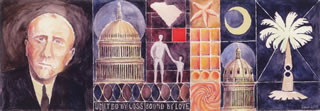





 Mr.
Byrnes said service to people was the only monument he felt worth leaving.
His scholarship program has helped more than 300 men and women who had
lost one or both parents. It symbolizes the closeness he kept with people.
Over and over scholars repeat the refrain: "I don't know how I could
have gone to college without his scholarship, but he gave much more important
things than what he gave in dollars." He didn't want a memory in
brick or stone. He wanted a memory that would live after he was gone.
Mr.
Byrnes said service to people was the only monument he felt worth leaving.
His scholarship program has helped more than 300 men and women who had
lost one or both parents. It symbolizes the closeness he kept with people.
Over and over scholars repeat the refrain: "I don't know how I could
have gone to college without his scholarship, but he gave much more important
things than what he gave in dollars." He didn't want a memory in
brick or stone. He wanted a memory that would live after he was gone. 

